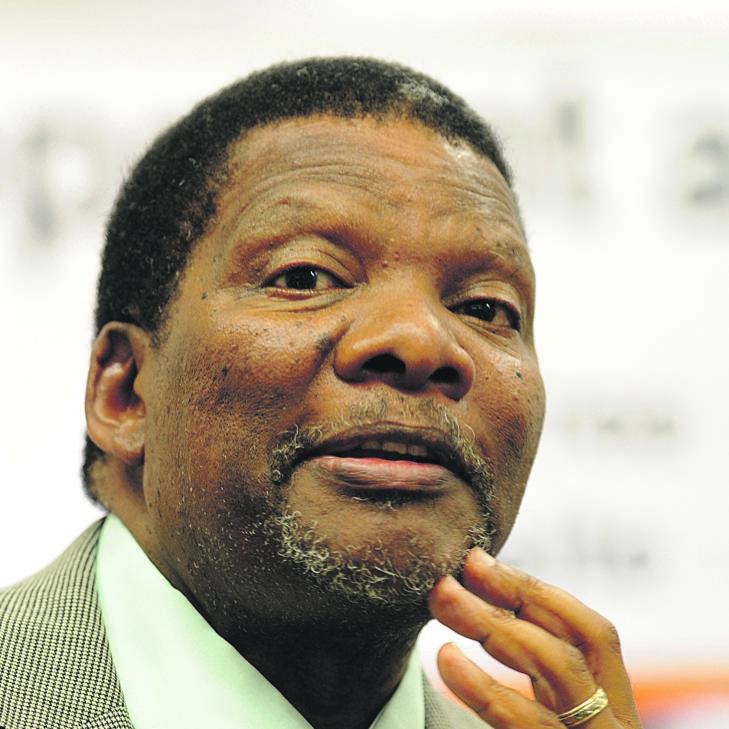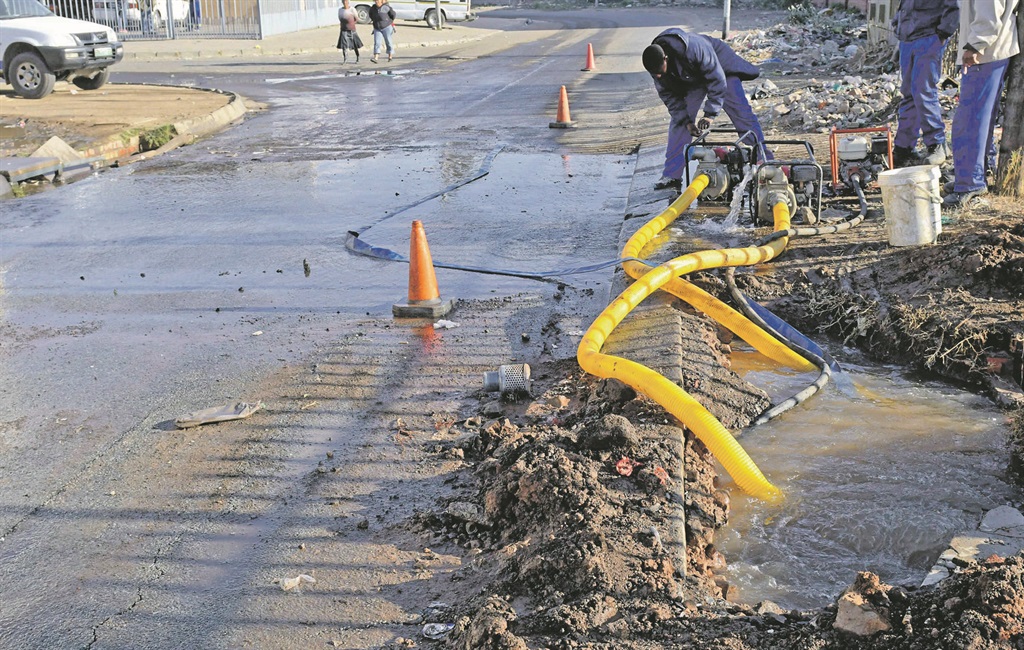
Minister Gugile Nkwinti’s water and sanitation department has no money to even pay for rent because it has allegedly poured R500 million of its budget this year into former president Jacob Zuma’s failed war on leaks project.
The department’s overall administration budget of R861 million, which is used to pay for leases, cleaning services, security services, bursaries and office buildings, has been depleted while more funds still required to pay for the war on leaks project, according to departmental documents in City Press’ possession.
Launched by Zuma in 2015, the war on leaks aimed to train 15 000 artisans who would be dispatched to fix broken water pipes in the country’s municipalities.
Since it was never a budget item, the department had to shift money from other programmes to keep it going.
Sources within the department claim that close to R3 billion (including the initial R680 million and R700 million last year) had been spent on the project since its launch.
In the first phase, the project had a high failure rate as only 910 of the 3 000 participants completed training.
From that number, only 252 managed to attain an artisan qualification, which meant that the overall success rate of the first phase was 8%.
According to an internal department document, the project had initially been funded from the water trading entity account.
However, it later shifted to the main account because “it supported the department’s skills- and capacity-building goals, as well as the operation and maintenance of infrastructure”.
However, some staff said training did not form part of the water department’s core mandate.
They argued that either the department of cooperative governance or the department of higher education, or both, would have been better placed to run with the project.
Adding to its devastating financial woes, the department continues to insist on spending more than it has by forging ahead with another plan to bring in a new contractor to complete 4% of the remaining work at the Hazelmere Dam project in KwaZulu-Natal, which could cost an extra R100 million or more.
City Press has seen correspondence that shows that even Treasury recommended a deviation process to allow the current contractor, Group Five, to complete the remaining work on the dam wall.
However, the proposals was rejected by acting director-general Deborah Mochotlhi, who insisted on a new tender process “sooner than later”, despite that delays in the completion of the project had been as a result of the department’s failure to procure the required material until the contract period expired.
DISCIPLINARY ACTION
Repeated requests for payments to be made for the war on leaks project as well Hazelmere dam tender and others have been mentioned as the source of an alleged conflict between mochotlhi and the deputy director of national water resources infrastructure, Zandile Makhathini.
Makhathini was set to appear before a disciplinary hearing on charges of gross misconduct, but those sympathetic to her said she was being victimised for taking a stand against the rampant waste of resources.
Between July and September this year, the war on leaks implementing agent, Rand Water, claimed R98 million from the department as stipends for trainees, many of whom had been languishing at home.
“There are risks to the project, department and implementing agent should payments not be made,” reads the request for approval for the July stipends.
“The integrity of the project can be compromised, and the behaviour of the trainees towards the implementing agent and department, as well as towards their properties, cannot be predicted,” it reads.
But Makhathini said no funds were available as the administration budget had been depleted.
A month later, on August 23, Makhathini again refused to pay, and made a note: “I do not have war on leaks allocation under programmes. Please indicate where the money will come from.”
On September 20, Makhathini again declined to approve payments for the project.
However, the day before, Mochotlhi had already taken a decision to bring disciplinary charges against her.
Several lawyers’ letters were subsequently exchanged, resulting in Makhathini’s suspension at the beginning of this month and a disciplinary hearing last week.
HAZELMERE'S 4% TENDER
Makhathini and Mochotlhi also fought about the plan to take the completion of Hazelmere Dam on tender.
The projected costs in the event of a new tender included inflation costs, which would go up as Group Five was using the 2013/14 prices when the project started.
Other expenditure would arise from the disestablishment of the Group Five site, then the establishment of the new contractor’s site as well as the purchase of critical equipment – such as the specialised jerk – which the department had already paid for when Group Five set up on site.
On August 23, Mochotlhi wrote to Makhathini about the consequences of the delay in the completion of Hazelmere, saying that she was “expected to speed up the process of going out on tender, thus a submission to that effect was expected sooner than later”.
“Instead of documentation to advertise the project as decided, you processed a submission threatening the department of dire consequences for not acceding to your late submission of a variation order,” said Mochotlhi.
“It must be pointed out to you that the very variation order submission has a lot of contradictory statements and would have placed the department in a compromised position regarding, among other things, financial regulations.”
Mochotlhi wanted the tender documents processed by August 27.
On September 11, the director of dam safety regulation, Wally Ramokopa, noted the risks involved, including that Group Five could withdraw its insurance of the work completed “because the scope of works covering the project would not have been completed as per the contract”.
“Would the proposed new contractor be in a position to assume full risk of the structure and be covered by the insurance?” Ramokopa asked.
He also said there was “a high possibility of developing inadequate project specifications and a mismatch on the bill of quantities”.
He wanted to know how the department would handle future disputes in terms of the behaviour of the structure after completion, asking “who bears the brunt, because you would now have four parties involved” – including two main contractors.
According to a report from the chief engineer on infrastructure development, Thabo Hloele, the Treasury had recommended to Mochotlhi that Group Five be appointed again through a deviation process.
“The Office of the Director-General subsequently issued an instruction to prepare the bid documents to complete the remainder of the works on the basis of open tender instead of the procedure recommended by Treasury,” said Hloele.
He said the contract with Group Five “remained enforceable unless one of the parties instituted a termination of the contract”.
“This route is often undesirable as it yields drastic consequences. The best way would be for the department to rectify its default by reinstating the contract to permit Group Five to complete the remaining work,” he added.
Departmental spokesperson Sputnik Ratau denied that retaining Group Five would not cost more than what had already been budgted.
“Any extension of time would be linked to additional costs such as those related to preliminary and general costs and time related costs, and would therefore be over and above the current contract value for Group Five.”
Ratau said the potential costs were yet to be established. However, he said, “a contract has lapsed due to the unforeseen ground conditions encountered when drilling to the dam wall. It is important that the department receives a valid quotation from the market first, before a comparison between the extension of Group Five contract against procurement of a new service provider”.
He said the liability and insurance of the work currently undertaken remained with Group Five.
Ratau did not respond to questions on war on leaks and the depleted administration budget.
 |
| ||||||||||||
| |||||||||||||




 Publications
Publications
 Partners
Partners









